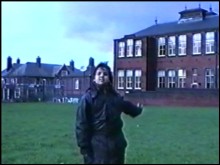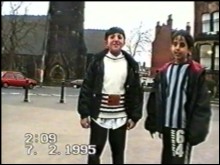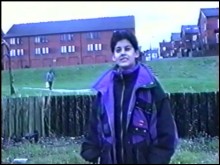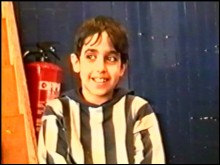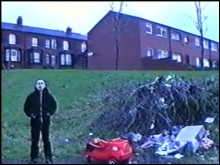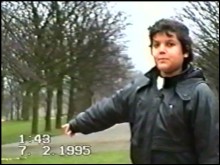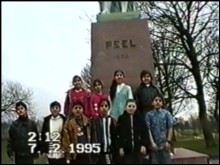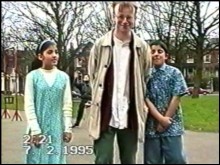Centre for Creative Media Research > Video Critical
Royal Park Primary School: Making the video
|
|
The local concerns reflected in the completed video had emerged, generally, in the first week's discussion. Interest was clearly focused on making a video about the local area, rather than more global issues. Indeed, no interest was shown in 'environmental issues' per se, but local concerns included the vandalism of public telephones, which the children didn't approve of, and that the area was not 'clean and tidy'. The parks were seen as 'getting messy' (Tabrez), and the theme of the neighbouring field, which it was felt the Council should have turned into a properly-maintained park, was first mentioned here. There was little agreement on whether or not they liked the area, but the children knew that a lot of people did not, because of the frequency of domestic burglaries in the area. Asked why people might burgle houses, the group quickly produced the answer 'to get money', and asked what they might want that for, Ryan suggested 'drugs'. Another area of Leeds, Chapeltown, was seen as a worse place to live, with Yasir saying that there were 'too much fights going on. They've got guns round there' - a view illustrated by (somewhat excited) talk of taxis being held up at gunpoint. The local streets were deemed not safe to play in, particularly because 'people nick cars and go mad'. Yasir noted that the speeding ramps promised for the area had not been put in yet, with Tabrez noting, 'It's a good idea, because the people that joyride knocked some people over'. The fair which visits Woodhouse Moor - which the children call 'Hyde Park' - every six months was seen as a more positive thing, although it didn't come often enough and was 'too dear'. Ryan agreed with Yasir's declared wish to live in Blackpool, so that they could go to the fair every day. In the first and second weeks the children produced some video around the school with a surprising degree of competence and confidence. This work was intended as video-making 'practice', but it became apparent that such rehearsal was not particularly necessary. In the third week we visited the field next to the school, and although in the first week's discussion the children had expressed neither interest nor concern about 'environmental issues' in the abstract, here they produced several arguments about the local field, 'naturally' and without prompting, and clearly felt quite strongly that the dumping of waste, and burning of benches and other matter was bad, and that the field could and indeed should be made into a much nicer park to serve the local community. In the following couple of weeks, filming around the school and in 'Hyde Park', environmental talk was largely limited to some appreciation of the relative merits of plant life around the school, and a clean, peaceful park. Comparisons were made, however, between the disappointingly unappealing field, and the park, which was deemed to be far superior. In the final week, the children interviewed each other, on video, in groups of three (one to operate the camera, one interviewer, one interviewee - all roles being rotated). Some clips from these appear in the final edited video, but some other comments are worth noting. Some of the children clearly found being on screen a rewarding and positive experience. Amaz, asked whether he liked to be seen on camera by his schoolmates, said 'I should be proud of myself'. Omar said he did not like to appear before his friends, 'because I was ashamed'; but he liked making the video 'very much - because it's fun'. Fozia too liked making the video, 'because it was interesting'. Asif enjoyed 'learning about the camera and playing on the swings'. Being in charge of the camera held a clear appeal, particularly when combined with some human interest. Yasir said he most liked 'making film of people', whilst Tabrez also liked to operate the camera, 'because you could film people'. The project cannot claim to have heightened environmental awareness across the board, however - at least not in an explicit sense. Amaz's appreciation of the park, according to his interview, was entirely due to the fact that he got the chance to play in it, for example. Nevertheless, all of the children said that they had enjoyed making the video. Summary The initial impression these children gave was that they were the victims of environmental ennui; they had heard about the subject on television often enough, and were familiar with some problems and related terms. However, they had little apparent interest in it. Their work on the video demonstrated, however, that when faced with environmental matters on their own doorstep, they became usually eloquent and energised about the subject. Whilst they remained ambivalent about the area in general, and still relatively unconcerned about environmentalism as a broader subject, the differences between the field and the park were clearly quite important to them, and it was this contrast - suggested by the children themselves, with no adult interventions - which structured the whole completed video. |
![]()
The text and images on this site are by David Gauntlett, © 1997, 2004.
Back to > Video Critical home.

